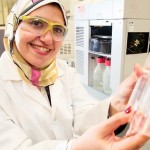
Aliaa Shallan
Pharmacist
Australian Centre for Research on Separation Science
Science does not always mean that you have to read pages of theoretical assumptions or spend hours in the lab exploding stuff.
Most of the science happens in our “normal” everyday activities. Consider breakfast, the nice smell of toasting bread is a result of a chemical reaction, making an omelette involves denaturing protein, and brewing coffee or tea is basically what chemists call a ‘solvent extraction’. And then the enjoyment of breakfast is really a fascinating cascade of chemical reactions including neurotransmitters and electrical signals to see, smell, and taste. For me, science is the art of making observations and spending some effort to explain them. It adds meaning to the little things we otherwise fail to appreciate.
I was always interested in how medicine can make you feel better. I would wonder how do medicines work? What side effects do they have? Can I make my own perfume? These questions were the primary motive for me to study pharmacy, which combines chemistry and biology. I learned about pharmaceuticals and medicinal herbs and a little about marketing and psychology.
The next question was how to make sure that a certain medication has the exact amount as the label says? So, I decided to develop new analytical methods that pharmaceutical companies can use as part of their quality control. That was my Masters research project.
Then I realized a bigger problem. How do we know that the patient is getting the appropriate dose? Sometimes we cannot wait to see if the patient will get better or worse. The only way to know for sure is to measure the concentration of the medication in blood. Is it possible to design a small device that can measure the amount of certain medications at home, within a few minutes, and using only a drop of blood? After doing some research and reading, I found that it is possible to design such a device based on microfluidics. This is why I came to Australia to start my PhD project and work with an amazing group of scientists at the Australian Centre for Research on Separation Science (ACROSS). I hope to create devices that will make dose adjustment easier and safer. I also hope to inspire more talented young people to take the exciting journey of exploration and discovery that is science!
For more information: www.utas.edu.au/across